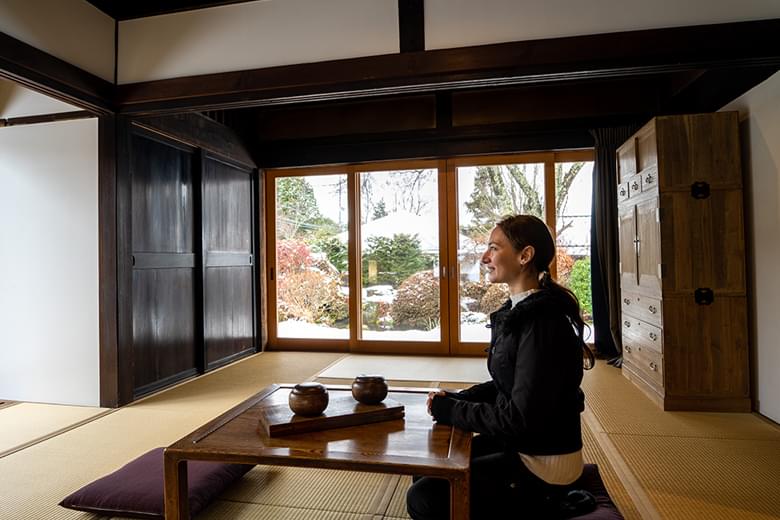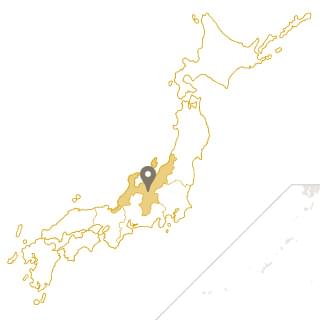Approximately 2 hours from Shinjuku Station by express train, the city of Chino is located at the foot of the Yatsugatake Mountains. There are many beautiful Japanese houses dotting the countryside in this remote mountain area that remains untouched by development. The wisdom and traditions of people who have lived in harmony with nature are still alive today, such as “Shimi” food culture. A trip to experience this special cuisine while staying in a century-old farmhouse is perfect for those who want to travel to an alternate Japan, different from busy tourist destinations.
Yamaura Stay
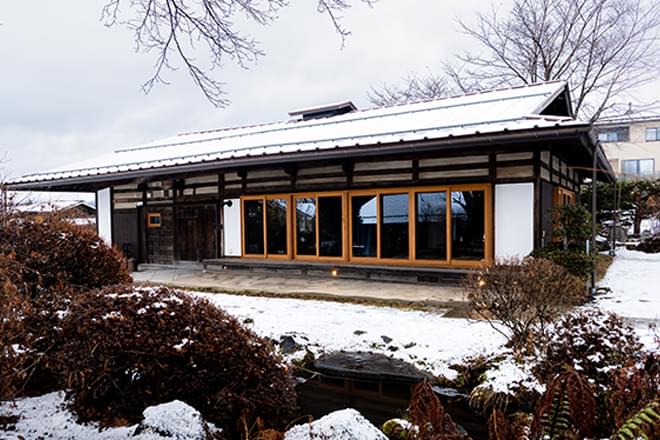
Yamaura Stay’s century-old farmhouses were renovated and produced by Alex Kerr, an East Asia researcher. The theme of Yamaura Stay is "Rural Retreat", and the farmhouses are located in a hidden village deep in the mountains, where traditional houses and beautiful farmland still remain. Here, instead of a busy sightseeing trip, you can relax in your farmhouse, take a walk in the village, and enjoy a relaxing time. One of the four restored farmhouses, Kiyomizu, is over 150 years old, and you can rent the entire farmhouse for a private stay.
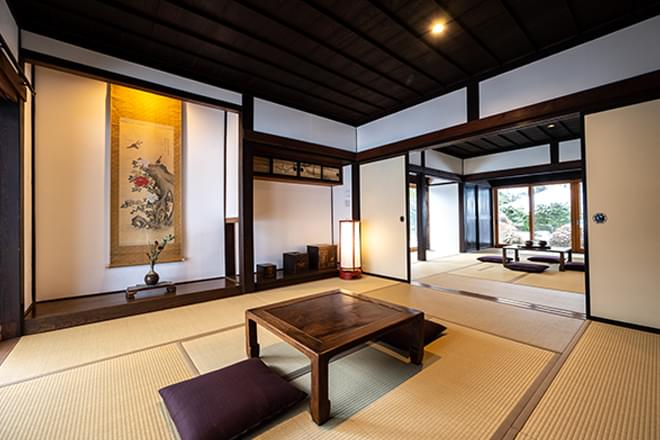
The rooms have been renovated with clean modern facilities, while retaining many of the original pillars and walls that you take you back in time. A freestanding projector, screen, and speakers are equipped so that you can enjoy large-screen movies in the tatami rooms or elsewhere in the house.
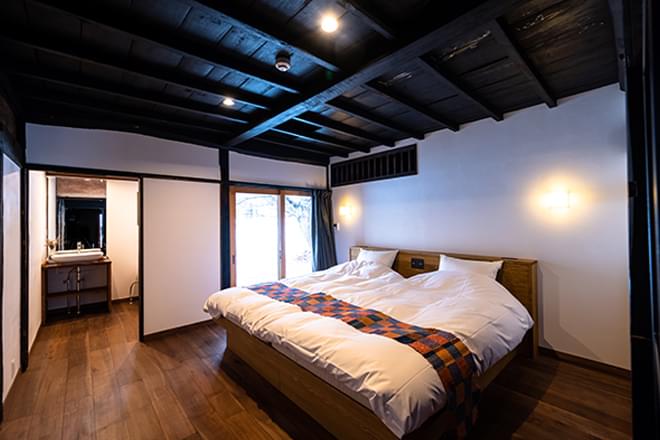
You can stay in a comfortable house with a wooden-floored bedroom, adjoining tatami rooms, a living room with a cozy fireplace, and a high-ceiling dining room with a fully furnished kitchen. Kiyomizu is a spacious house on a large property that can comfortably accommodate groups or families.
- Name:
- Yamaura Stay
- Address:
- Not open to the public
- Phone number:
- 0266-73-8550 (Chino Tourism Organization)
- Email:
- ask8@chinotabi.jp
Making and tasting "Shimi" dishes
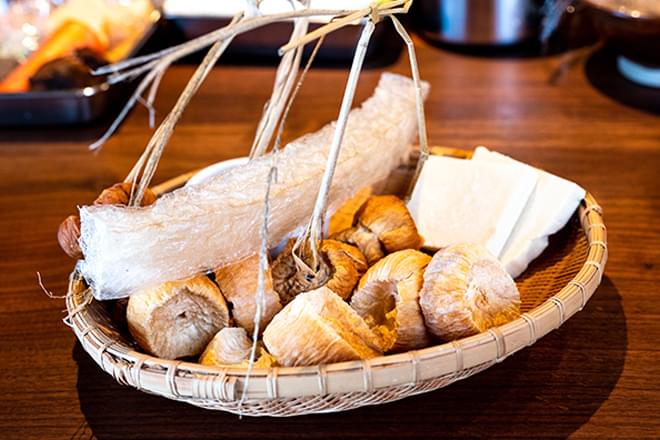
Chino City has inherited a food culture called "Shimi", which takes advantage of the freezing cold, sunny, and dry weather in winter. "Shimi" is a method of preserving foods such as tofu, daikon radish, and rice cakes. These foods are hung outside to freeze overnight and melt during the day. This cycle of freezing and dehydrating naturally freeze-dries the foods, and they can only be made in temperatures below -10℃. At Yamaura Stay, you can experience cooking these traditional foods with the help of local grannies.
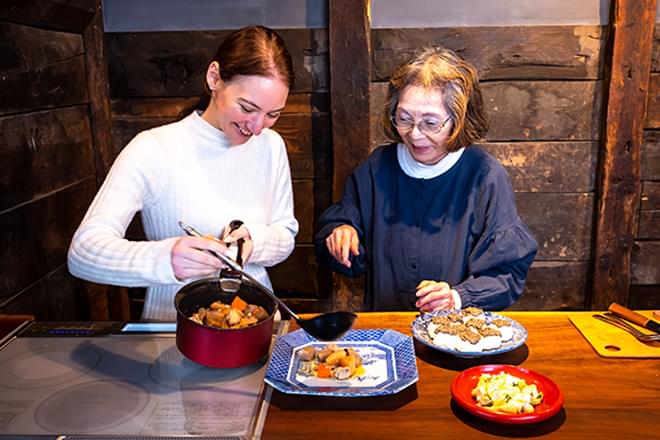
You can cook a dish called "Shimi Dofu", which is made from freeze-dried tofu, carrots, burdock root, and konnyaku (a processed food made from yam).
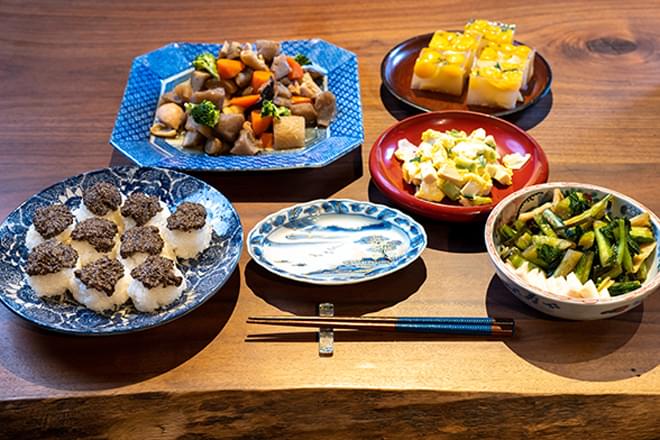
You will make 3-4 local Chino dishes using agar (made from seaweed) and other freeze-dried ingredients. You will find that these dishes are very healthy, use plenty of vegetables and gluten-free ingredients, and use very little oil.
- Name:
- Cook traditional dishes with the village grannies
- Phone number:
- 0266-73-8550 (Chino Tourism Organization)
- Email:
- ask8@chinotabi.jp
Mori no Ya Hanamaki-ten
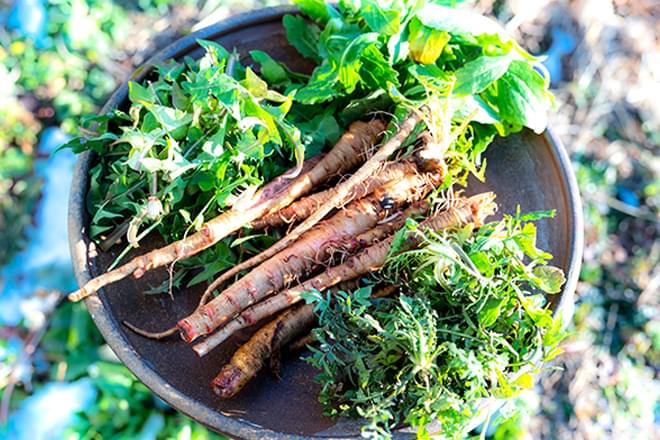
For dinner, enjoy local cuisine that features "Dote Kusa". Dote Kusa are weeds that grow in the rice paddies and fields. It is a unique dish offering a vitality and nourishment that cannot be found in cultivated vegetables. Dote Kusa used are picked from clean land that is undisturbed by people, and are purchased from experienced local experts. The type of "Dote Kusa" varies depending on the season. The leaves, flowers, and roots of the plants are cooked and served.
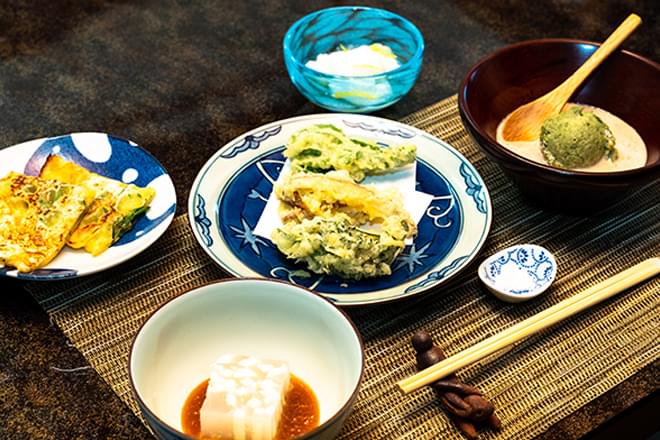
Dote Kusa tastes bitter when eaten raw, but when they are deep fried as tempura, the bitterness disappears and they become much sweeter. They are also delicious when eaten thinly sliced like a crepe. In addition to Dote Kusa, visitors can enjoy other local delicacies such as "Soba Gaki" (buckwheat dumplings) with walnut miso sauce.
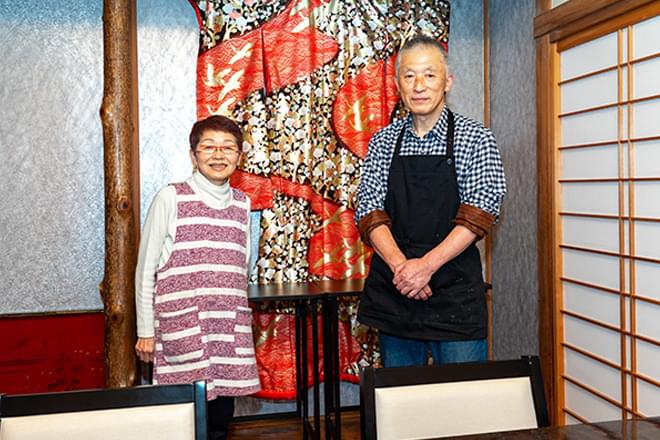
You can dine in a room where beautiful kimonos are displayed, with detailed explanations of the Dote Kusa cuisine provided. It takes about 10 minutes by car from Yamaura Stay Kiyomizu to the restaurant. Delivery of boxed lunches to Kiyomizu are also available.
- Name:
- Morinoya Hanamaki Ten
- Address:
- 6595-104 Kohigashi, Chino-shi, Nagano, Japan
- Phone number:
- 0266-73-8550 (Chino Tourism Organization)
- Email:
- ask8@chinotabi.jp
Kamosuya
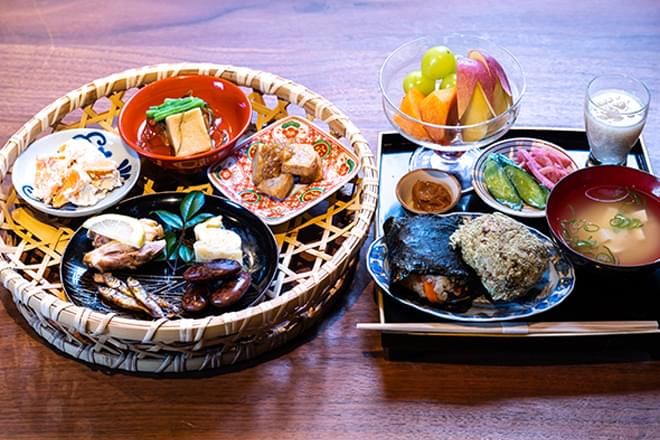
Breakfast delivery is available during your time at Yamaura Stay. Hand-made fermented foods that Japanese people have eaten since ancient times are commonly used in the dishes, such as miso made from fermented soybeans, and amazake, which is a drink made from fermented rice. Fermented foods not only have a deep flavor but are also healthy ingredients that help regulate the gastrointestinal tract. Homemade pickled plums, egg and agar cake, locally grown fruits, and other simple yet flavorful dishes are also served.
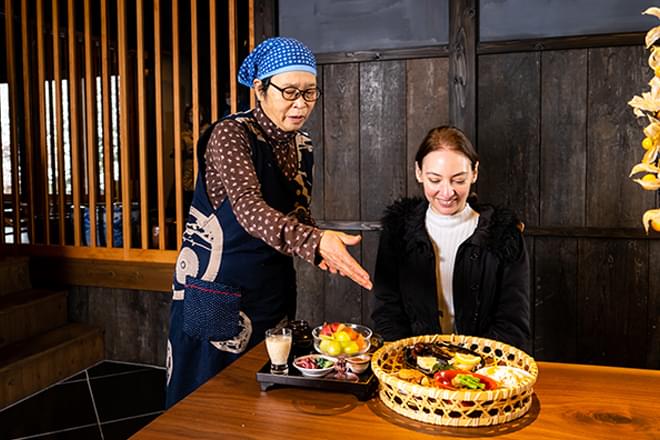
Junko Ariura of Kamosuya prepares the dishes. She beautifully arranges the delivered dishes in bamboo baskets and lacquered dishes, and tells you about them. Ms. Ariura also offers a miso making workshop. Be sure to ask her about it if you are interested.
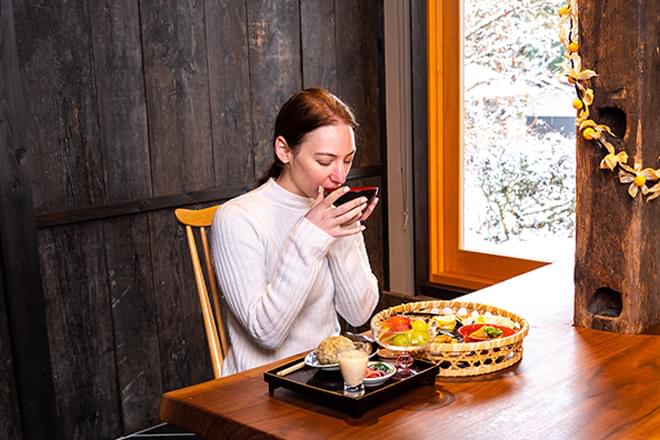
The soybeans used in Kamosuya’s miso are prepared over a bonfire for 5 to 6 hours, and these beans mixed with koji rice and salt are left to ferment for months. The result is a unique miso, which Ms. Ariura uses in her homemade miso soup. A great day starts with a Slow Food breakfast.
- Name:
- Kamosuya
Yamaura Stay guest-only plan
- Phone number:
- 0266-73-8550 (Chino Tourism Organization)
- Email:
- ask8@chinotabi.jp
Learning about agar sticks in Japan's no.1 production area
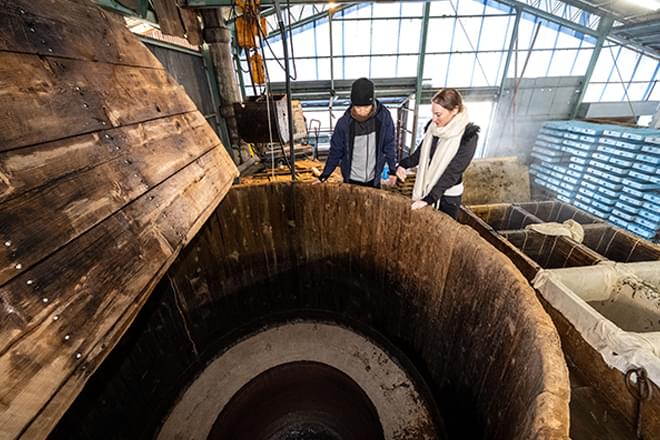
Natural agar (kanten) production has been practiced in Chino City since ancient times, and the city boasts the largest production in Japan. Agar is made by boiling seaweed called tengusa, extracting only the viscous component and hardening it. The reason why Chino City, far from the sea and deep in the mountains, has come to produce processed seaweed products is because of its abundance of clean water, cold winters, and dry climate. These are the perfect conditions for agar production. A tour where you can see, learn about, and experience the traditional food culture that is unique to this region is highly recommended.
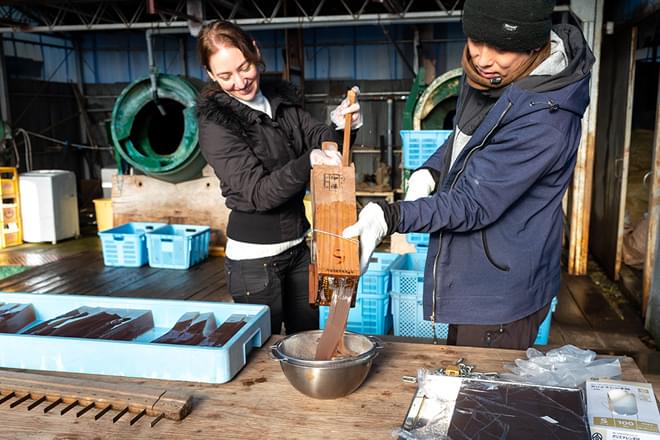
After observing the production site, visitors will try their hand at "Tentsuki,” a process where agar is pushed through a special box. The box is open on one end and has a grid on the other, so when the agar is pushed through the box, clear noodle-like agar comes out from the bottom. This is called "Tokoroten," which is served with vinegar and soy sauce, dressing, or brown sugar syrup.
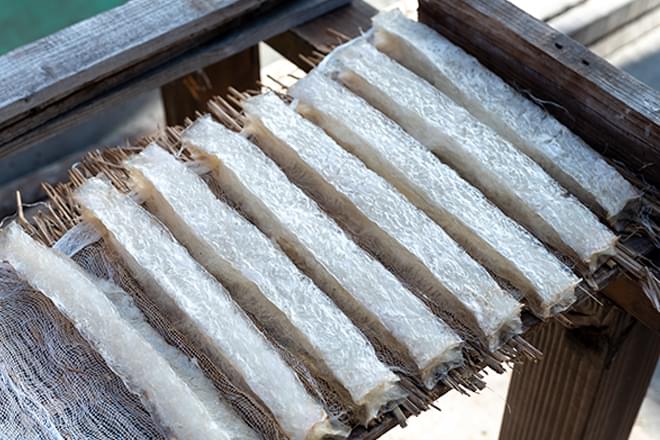
From mid-December to February, you can see the kanten fields glowing silver under the clear winter sky. Jelly-like brown agar turns white when dried and becomes “Bo Kanten (agar sticks)”. These sticks are often used in savory dishes, and can also be used to make plant-based jelly-like desserts.
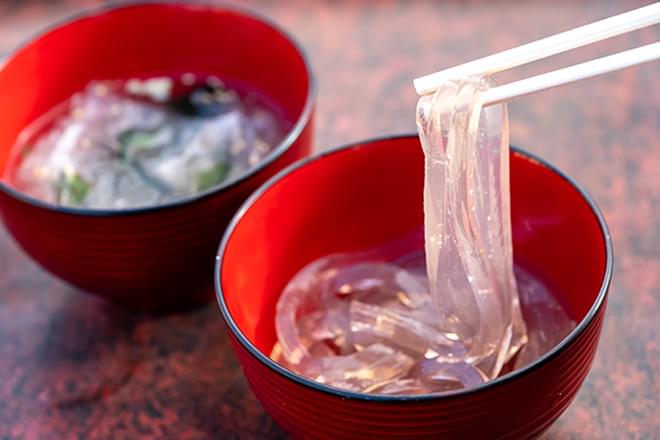
- Name:
- Kanten, a harvest of ice
- Address:
- 1253 Kitayama Yugawa, Chino-shi, Nagano
- Phone number:
- 0266-73-8550 (Chino Tourism Organization)
- Email:
- ask8@chinotabi.jp
